WordPress vs Everyone Else
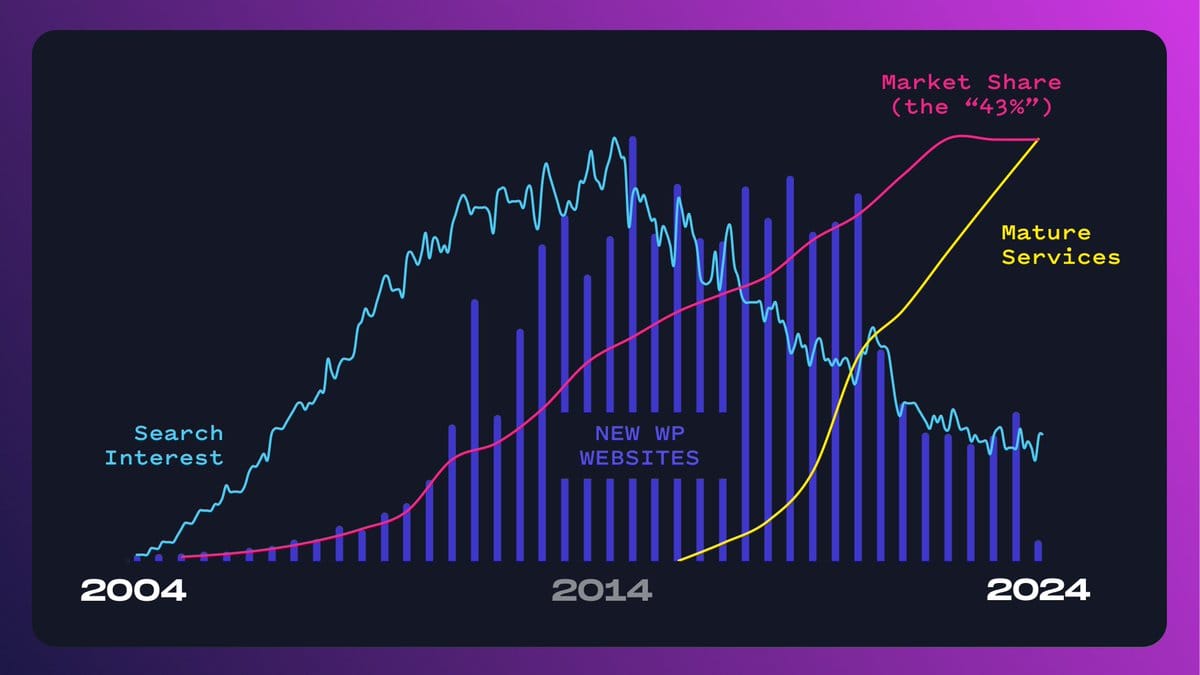
I got caught up in a fascinating discussion in Kevin Geary’s Inner Circle sparked by Jamie Marsland’s video about Wix’s "secret plan to conquer WordPress." It brought up a lot of great points about the future of WordPress and how it lags behind it's modern competitors in just about every category, except being open source.
WordPress vs Everyone Else
Here's an image that Jamie shared in his video. You can see search interest in WordPress peaking around 2014 and the amount of new sites being built on WordPress starts to decline and falls off a cliff around 2020.

From websites to social media and back again
From 2012 onward, smart phones and social media became ubiquitous. It's plausible that there were just fewer new websites being built overall. As many chose to launch their business on social media, Facebook, Etsy, or Shopify instead. Social media killed blogging for the most part. People chose to write where the readers were on sites like Medium and Substack. It felt almost pointless to build a standalone website when you can just post on social media and see instantaneous engagement.
However, the standalone website isn't going away. Just about every business needs a website as their home base. A place to host and own their content. And no, not just a Linktree, where their website consists of just social media links. But a real actual website where your creations and offerings live, in the way you want them to.
It started to become a real risk building your business on a social media platform. You could get deplatformed or canceled. You could get shadowbanned. You could see your engagement rates plummet as the algorithm changes. You could see your voice start to slowly transform into whatever it is that suits the algorithm, distancing yourself from your authenticity. You start writing for likes and engagement and not from your own truth. In fact, on many of these platforms, you might stifle your self-expression or self-censor out of fear of upsetting the mob.
It's clear that a platform-first approach is to risky. Having a home-base, a place where all your social media activity funnels back to, is important. This has sparked sort of a personal website renaissance. I've talked about this before in my post The Return of the Personal Website. People are starting to realize how important is is to own your content. To not risk building your foundation on rented land.
Why WordPress is lagging behind
So coming back to the Jamie Marsland video about Wix gunning for WordPress... what he shows in the video is their Wix Studio product. A website builder for agencies and experienced designers. It's not the dumbed-down Wix of old, where your Grandma could make a website with a few clicks. No, Wix Studio looks serious.
But was Jamie just being hyperbolic by saying it was Wix's "secret plan to take down WordPress"? It's probably not a "secret plan" but something more mundane. Wix is a for-profit company with clear vision of who their product is for. They also have a marketing department of 200 people!
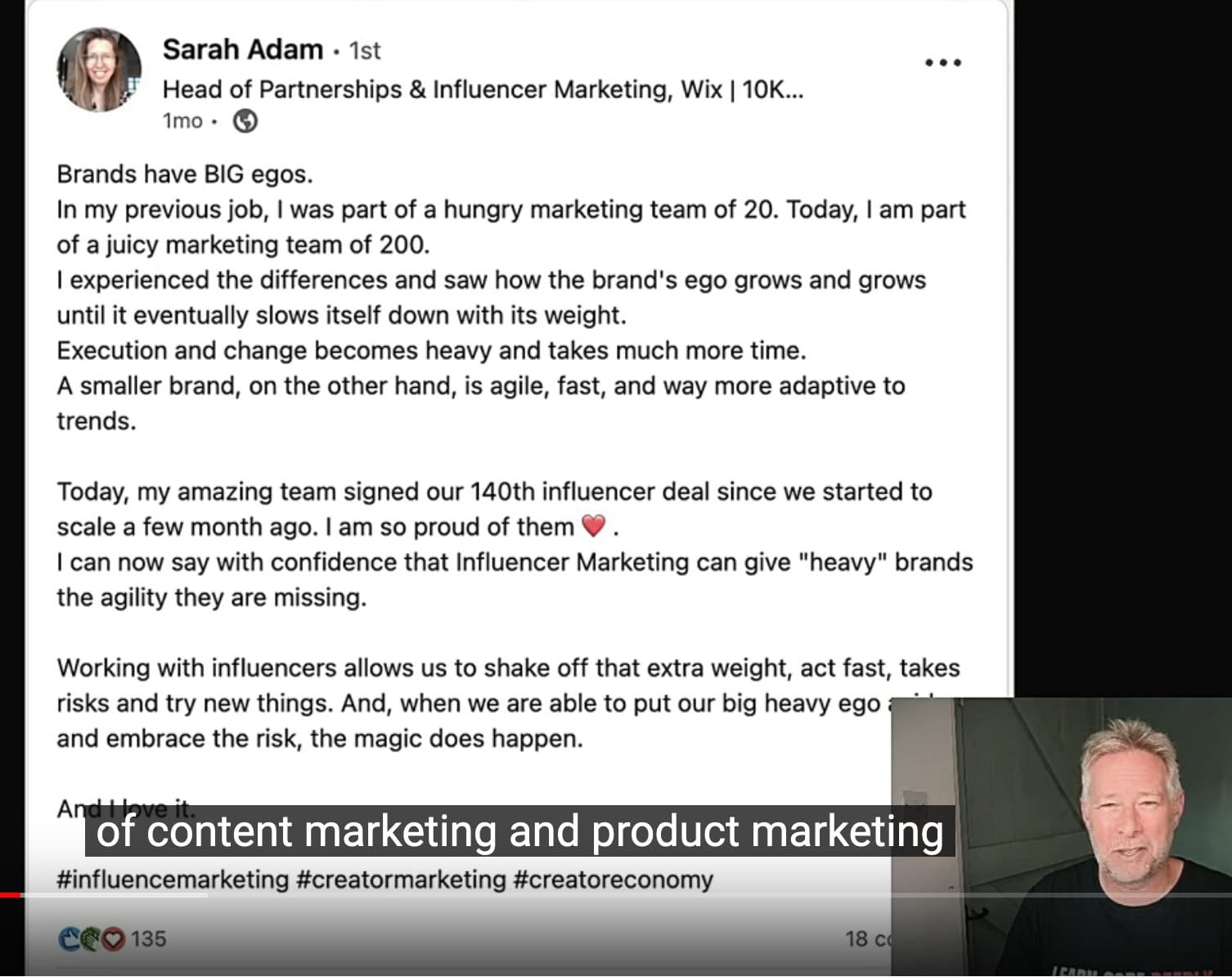
And this is what some believe is keeping WordPress stuck in the 2010s.
Just look at this long tweet from Kevin Geary in response to Jamie's video:
Here's a screenshot the main gist of his tweet:
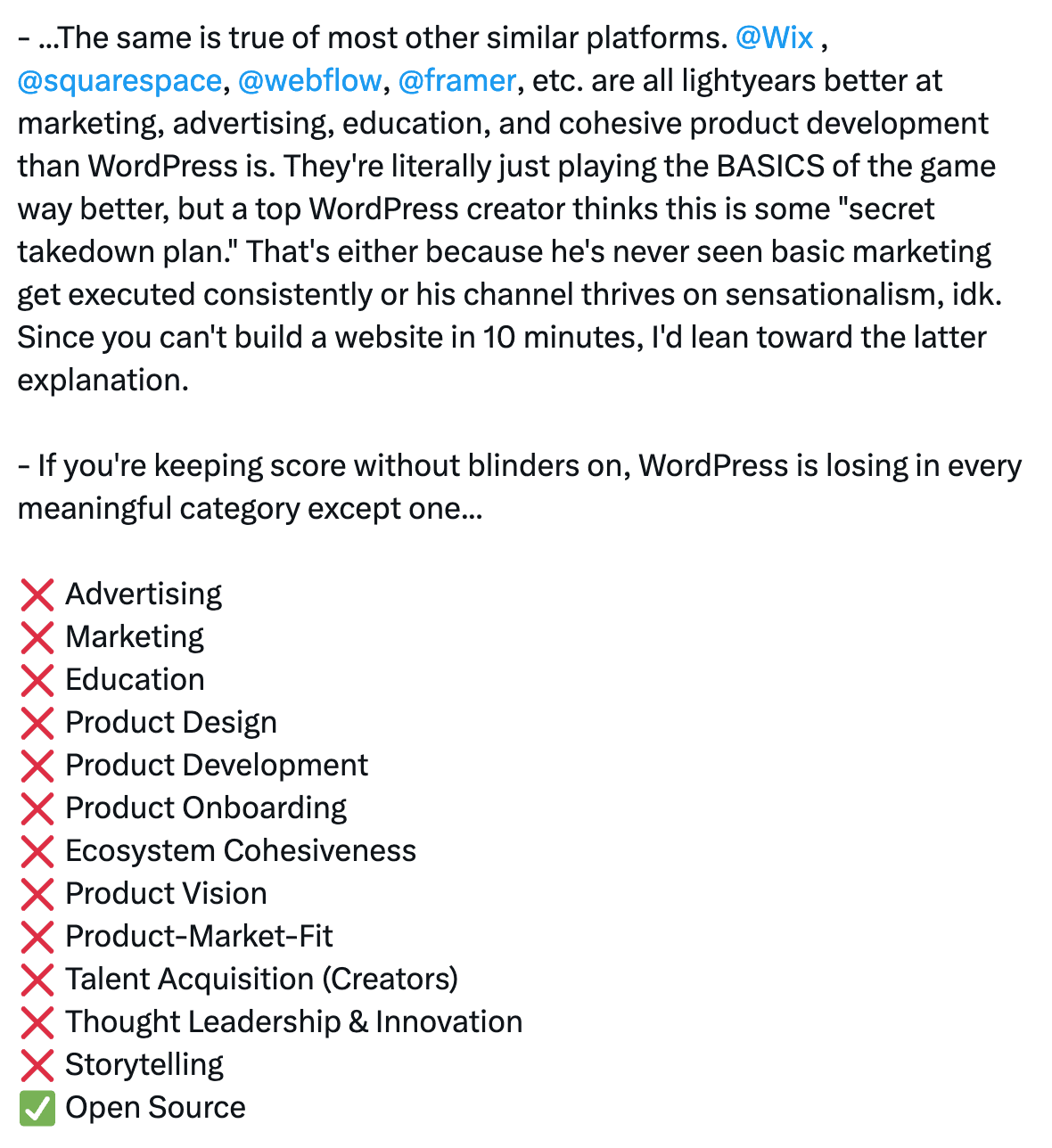
He then goes on to give examples of the state of WordPress in 2024, and it's not exactly flattering. But here's his conclusion:
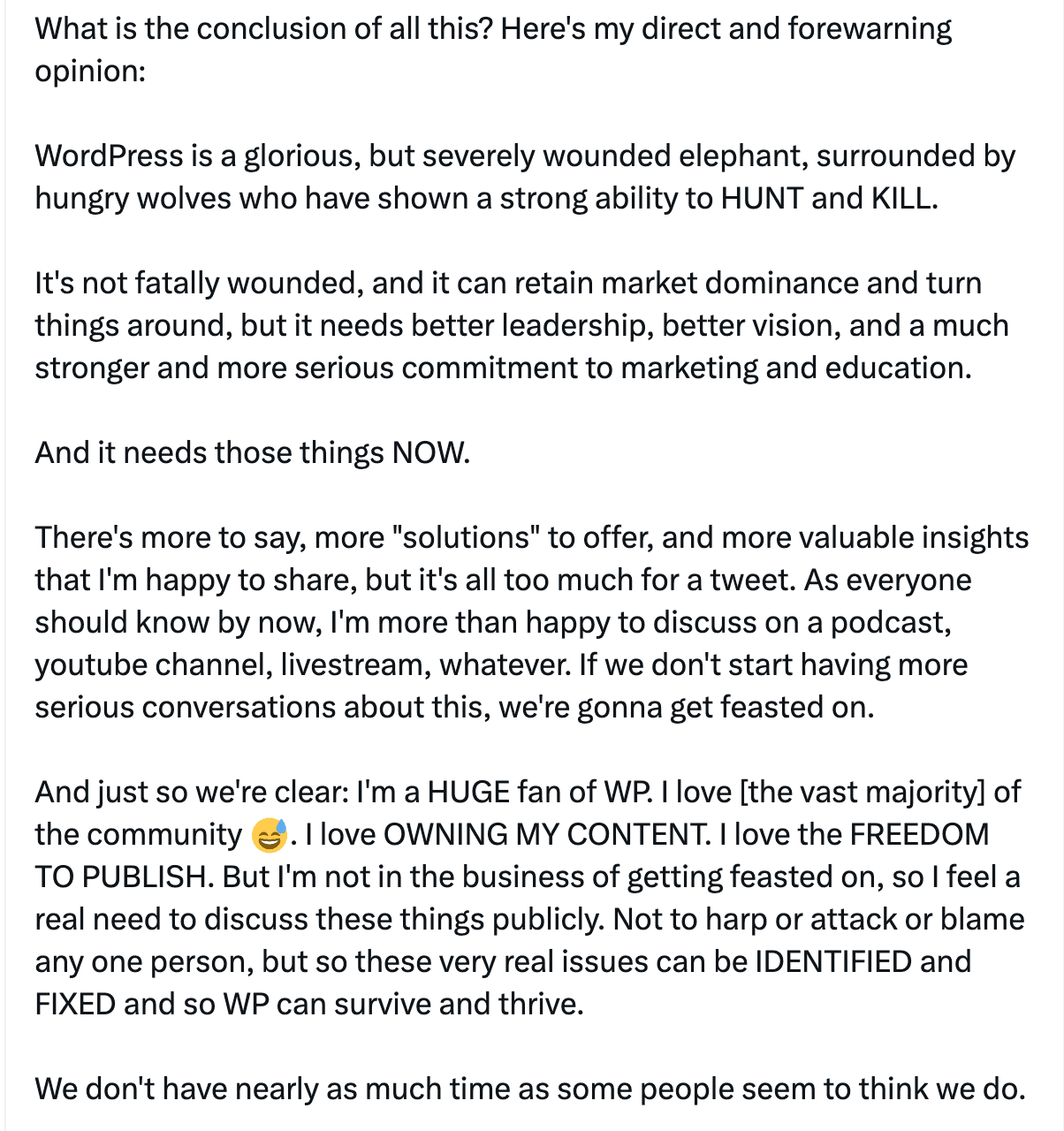
Is WordPress really just for oldheads?
Then we got this response from Mark Szymanski. He said what a lot of people are thinking. And as an admittedly younger WordPress user (28 years old) and he addresses the lack of interest in WordPress from the younger generations. I was writing about this a few months ago in my post, Is WordPress just for oldheads?
The open source values that WordPress.org stands on are values held strongly by the Gen-Xers and Millennials that created it. But does Gen-Z really care about open source when they grew up on social media? Do they even care about the freedom of owning your own content?
That's a good question. Mark also gets into how site builders like Webflow and Framer just blow WordPress out of the water with their slick UI designs with snappy animations and interactions. They spend a lot on marketing and education. Gen-Zers live in the world of apps. Not websites. If WordPress wants to succeed, they need to understand what they do best and lean into it and stop trying to be "for everyone."
If you're into this conversation, I also recommend Mark's guest appearance on the WP Tonic podcast. Yes, it's a few oldheads criticizing the state of WordPress today and their sus leadership. But they make some illuminating points. I am fascinated by it all.
Websites all look the same these days
One more thing, the fact that the younger generation grew up on apps not websites is important. They are used to a certain standard of UI/UX design. A standard that has been created by Apple, Google, and Microsoft. Those design standards are easily met with frameworks and UI kits that make it easy to design something that fits in with their ecosystems.
But it kinda makes every design look the same. This sort of flattening of web design is worth considering. Gone are the wild west days where every site had a unique look and feel. Where unique designs were the norm. I remember the May 1 Reboot trend from the early 2000s. Where web designers would relaunch their new site on May 1st with a sick new design filled with hard to read text and flash animations.
Take a look at this tweet from Dann Petty today. He's talking about why designs look so samey nowadays, and why design uniqueness isn't as desired as it once was. He talks about the increase in standardized UI kits (and I'll add themes, templates, and no-code drag-and-drop page builders) has made it harder to find real talent.
Is it all just marketing?
In my WordPress for Oldheads post, I wondered if all the hype around Webflow and Framer was just marketing? Since they only make up 0.7% of the websites on the internet, compared to WordPress's 43%? (source)
Well I had one reader reply back astutely, yes Jeff it's all marketing. All marketing, all the time. And as Kevin Geary's tweet would suggest, WordPress is failing in this area (among other areas).
But does it need marketing? Does it even need to be "cool?" I mean, putting a shiny coat of paint on top of a shit product and spending millions on a Super Bowl commercial doesn't make something good. Not everything needs a 200-person marketing department.
If WordPress suddenly focused on marketing, that wouldn't change the nuts and bolts on the inside. It is like an elephant. They're trying to modernize with the Gutenberg editor and Full Site Editing, but progress creeps along because of "design by committee" problem that community driven projects have. It's not driven by a centralized philosophy with real thought leadership (as Kevin points out). It's a community driven project, not a commercial product. But it's also a commercial product. It's confusing (see this article).
Kevin shared this tweet this morning on how he feels WordPress could simply make the wordpress.org (the open source project) for professionals, and wordpress.com for "everyone" with a dumb-down page builder like Wix.
A common complaint is that you need third-party plugins to have what's now very common functionality. Consider organizing your media library into folders (can't do that without a plugin). Or custom post types for things other than pages or posts. You need a plugin if you want to add collections of content like services, team members, frequently asked questions, portfolio items, music albums, or whatever else. That's fine by me, it works. We've made it work.
Modern CMS's are making strides in this area. Including Wix Studio...
Wait, Wix's CMS did what?
Seriously, check this out. Fellow KG Inner Circle member Brendan O'Connell posted a follow up video to all this discussion. He signed up for Wix Studio and Framer to test and see how their CMS portion compares to WordPress. Funnily enough, he starts off with WordPress and runs into an error. Lol, this isn't anything I've encountered and makes WordPress look pretty bad, but it's not the norm.
But take it with a grain of salt and enjoy how mind-blowingly fast Wix Studio was at creating custom post types. I was shocked. In WordPress this would have required a third party plugin and several different admin screens and clicking around. Wix did it just a few clicks, with AI too. 🤯
Having said all that, you might wonder why I'm still using WordPress?
That's what I know and all my content is on WordPress, so it makes sense to just port it over to a new site. But more importantly, because I own my website. I own my content. I'm not held hostage by a platform or influenced by an algorithm. I share my creations and ideas my way and it will be online as long as I want them to be. It's nice having my own home on the web. A digital garden of sorts.
And it's still by-and-large a reliable tool for professional use. But I am keeping an eye on things and seeing where it goes. A year from now we'll see!
I'm loving this open discussion though and I hope to see more of it.
No spam, no sharing to third party. Only you and me.





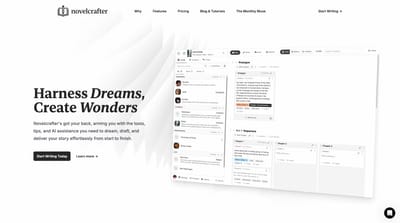
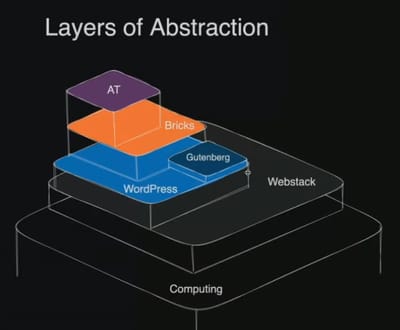

Member discussion